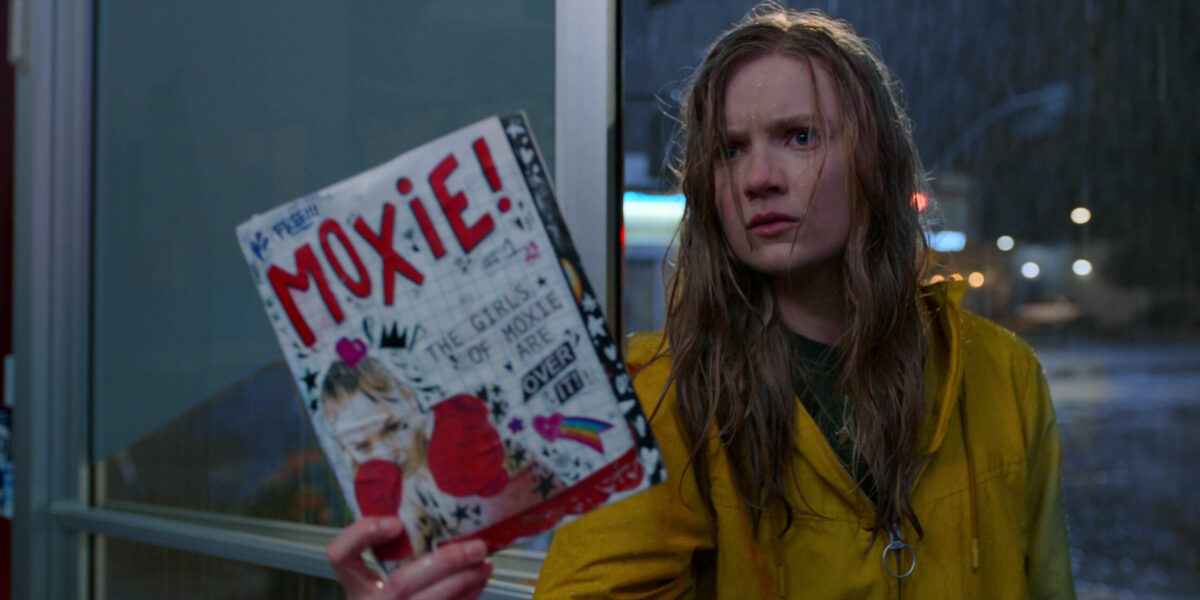Review: Gen Z Discovers the Riot Grrrl Movement in Amy Poehler’s Moxie

There comes a time in every girl’s life when she’s forced to contend with the eternal truth of life under the patriarchy. Maybe it’s when a boy’s harassment is written off as “annoying,” or a fashion choice is labeled “distracting” to male students, or perhaps it’s the continued prioritization of boys’ athletics over girls’ teams. It’s a bitter realization that soon pivots to righteous indignation and anger, simmering just below the surface for some, and boiling over for others.
In Amy Poehler’s new Netflix film Moxie, quiet teenager Vivian (Hadley Robinson) experiences her own awakening at the beginning of her junior of high school. Vivian, raised by single mom Lisa (Poehler), is content to go through high school with her head down, until she meets Lucy (Alycia Pascual-Peña), an outspoken transfer student who is quick to call out the sexist BS in their high school. Inspired by Lucy, Vivian digs through her mom’s old riot grrrl zines and albums, and decides to publish a feminist zine of her own, titled Moxie. The zine takes off, and several girls in the school form a feminist club in the zine’s name.
Based on the YA novel by Jennifer Mathieu, Moxie is a delightful trip down memory lane for 90s women who longingly remember the riot grrrl days. Poehler does a good job of calling out the movement’s major shortcomings, like its lack of intersectionality and other problematic issues born of the movement’s roots in white feminism. The film also explores the many forms that allyship can take, and the privileges of rebelling as a white girl vs. rebelling as the daughter of Chinese immigrants, as Vivian’s best friend Claudia (Lauren Tsai) discovers.
It’s refreshing to see a teen coming of age film directly tackle political issues and feminist awakening. And it’s hard to resist the charismatic squad of Moxie grrrls, as they band together and fight the power against a backdrop of Bikini Kill lyrics. The team quickly finds themselves at odds with bullying jock Mitchell (Patrick Schwarzenegger) and dismissive Principal Shelly (an underused Marcia Gay Harden). But at times the movie bites off more than it can chew. The film wants to tackle serious issues like sexual assault, but stumbles in trying to maintain its breezy girl power narrative. These heavier issues aren’t given the time and consideration they need before everything is tied in a neat little bow at the end.
The film’s pacing is off as well, with some scenes dragging on while other characters and revelations are given short shrift. At one point, Vivian has a fight with her mother over her dad not wanting to spend Christmas with her. It’s a jarring line, as this is the first time her father has been mentioned in the film, and he’s never mentioned again. Other plot points struggle to hold water: if Vivian was raised by former riot grrrl Lisa, then shouldn’t she be more aware of the blatant sexism at her school? It’s not as if Poehler’s character kept her past a secret: there is literally a room in their house filled with zines, posters, and an extremely cool leather jacket.
Still, despite its shortcomings, Moxie is an engaging and entertaining watch. The cast is stacked with talented young actors, and girls will find a new feminist dream boyfriend in Seth Acosta (Nico Hiraga), Vivian’s romantic interest. Still, I can’t help but wonder what the film would look like if it were centered on Claudia or Lucy instead of Vivian. Now THAT would be a revolution girl style now.
(featured image: Netflix)
Want more stories like this? Become a subscriber and support the site!
—The Mary Sue has a strict comment policy that forbids, but is not limited to, personal insults toward anyone, hate speech, and trolling.—
Have a tip we should know? tips@themarysue.com